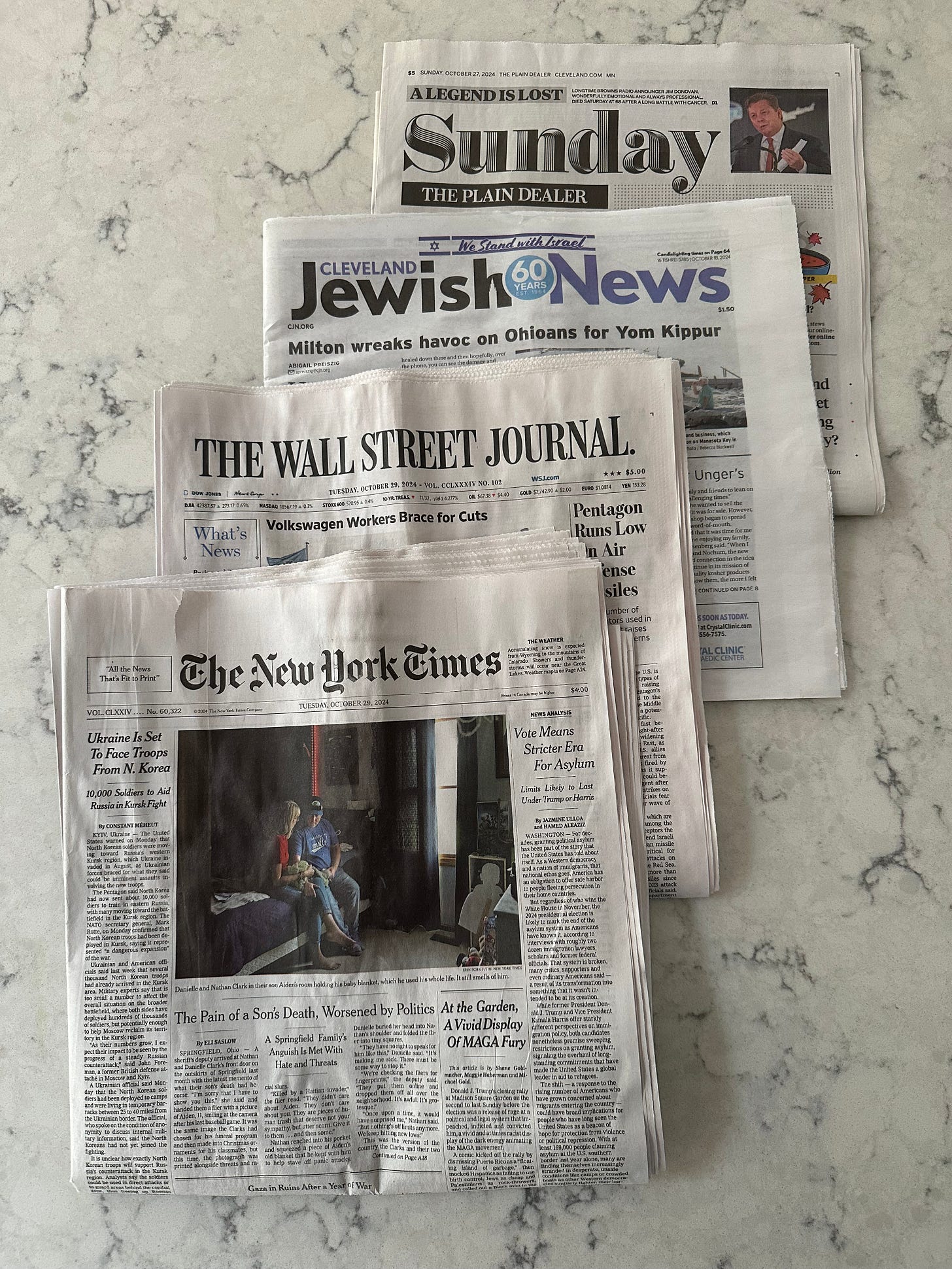Journalism has been called a lot of things:
The first rough draft of history. The Fourth Estate. What somebody somewhere wants to suppress. The immune system of Democracy.
It is all those and more.
And it still matters, now more than ever.
The first thing dictators do when they take over a country is to take over the newspapers, radio stations and television networks. Control the media and you control the people.
We need to strengthen our Fourth Estate, not cheer as it falls.
More than 200,000 people cancelled their subscriptions to the Washington Post this week.
I hope and pray that they will return or subscribe to another powerful paper like the New York Times or the Philadelphia Inquirer, papers courageous enough to endorse a presidential candidate.
Editorial endorsements matter.
This is one of the most important presidential elections of our lives. It doesn’t just matter to readers of that newspaper, it matters to the candidates, who use those endorsements in their ads to sway voters and to collect more money to win.
It matters to families huddled under rubble in Ukraine, children starving to death in Gaza, students terrified of terrorist attacks in Israel.
What we do in America matters to the whole world. What the next president does is a matter of life and death to them.
I’ve been a professional journalist since 1986. I wrote for the Lorain Journal, the Akron Beacon Journal, The Plain Dealer and currently write for the Cleveland Jewish News.
For years, instead of a purse I carried a backpack with reporter notebooks, piles of pens and a copy of the U. S. Constitution. It was my shield against anyone trying to stop me from reporting the truth from a courtroom, crime scene or street corner.
It reminded me that I have the right and responsibility to write the truth.
The Bill of Rights, that precious First Amendment, protects freedom of speech and freedom of the press. My rights. Your rights. Our rights.
In 2013 I joined the Cleveland Jewish News as a columnist. It’s exciting to see the paper celebrate sixty years of journalism this year. It’s a small paper, but a powerful paper and an important one.
Anti-Semitism is on the rise all over the world.
So is hatred for other minorities, for Haitian immigrants and Puerto Ricans who listened in horror as Puerto Rico was called a floating island of garbage at the Trump rally in Madison Square Garden, where a man joked of Black people carving watermelons instead of pumpkins.
How could the Washington Post fail us now?
The owner killed an endorsement of Kamala Harris, not out of fear. It was an abuse of power by a billionaire who is not even a journalist.
The Philadelphia Inquirer took the high road with this endorsement of Kamala Harris:
“There has never been a more important presidential election in our lifetime… the choice is clear and obvious. Vice President Kamal Harris wants to help all Americans. Donald Trump wants to help himself… There is only one candidate – Kamala Harris – who will preserve, protect, and defend the Constitution of the United States from foreign and domestic enemies.
A great investigative reporter once told me we had a front row seat to history during the greatest years of journalism: Between Watergate and Twitter.
Does it really end there?
The Washington Post was one of the strongest pillars of journalism. Reporters Bob Woodward and Carl Bernstein inspired generations of students to become reporters, including me. Their exposure of the 1972 Watergate break-in at the Democratic National Committee headquarters drove a crooked president from office.
That power works on the local level, too.
Journalists take on prosecutors who hide evidence and leave innocent people stranded on Death Row, judges who behave badly in court, Catholic bishops who allow pedophile priests to find more victims, CEO’s who walk away with million-dollar bonuses while their blue-collar workers lose their livelihoods in layoffs and plant closings.
And yet I still hear people question whether journalism matters.
We subscribe to five newspapers: The print versions of the New York Times, the Wall Street Journal, the Plain Dealer and the Cleveland Jewish News. We also get the online version of the Washington Post.
The killing of the editorial endorsement and cancellation by 200,000 subscribers made me appreciate even more the work journalists do all over the world to uncover the truth.
Those photos that tell the history of the world at its turning points had a dedicated journalist behind the camera.
They captured the naked girl running from napalm in Vietnam, the horrified woman kneeling next to a dead student at Kent State University on May 4, 1970 when college students were gunned down for protesting a war, that solitary brave man standing in front of a column of tanks at Tiananmen Square.
Who will be there to take those photos? To tell those stories? To speak truth to power?
Instead of a promise, the Washington Post motto now feels like a threat:
Democracy dies in darkness
Don’t let it.





We are among the 200,000 who canceled our WaPo subscription. After Bezos tipped the scale of journalism so his editors could not endorse a Presidential candidate I will never again trust anything written there to not have been influenced by Bezos instead of being honest reporting. The trust in the WaPo is gone. I see no reason to pay for news I do not trust.
Thanks, Regina, for the potent reminder of the power of journalism. I'm appalled that Bezos is bowing to fear of Trump like this, but I won't cancel my Post subscription. We need that journalism too much. As a former journalist (and Substack writer -- Telling My Age) myself, I know the obligation we all have to keep writing and telling truth to power. Congratulations on your Substack launch!